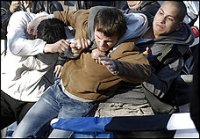Estonian authorities re-erect a statue commemorating Soviet soldiers killed during World War II
Estonian authorities on Monday re-erected a statue commemorating Soviet soldiers killed during World War II at a military cemetery, three days after its removal from a Tallinn square provoked protests by ethnic Russians.

The Bronze Soldier was immediately open for public viewing at the Defense Forces cemetery in the Estonian capital, Defense Ministry spokeswoman Aet Kukk said.
Police clashed with Russian-speaking Estonians angered by the government's move to relocate the statue and nearby war grave, which some ethnic Estonians consider a bitter reminder of nearly 50 years of Soviet occupation.
One man was stabbed to death, more than 150 people were injured and some 1,100 detained in three nights of rioting the worst violence since Estonia won independence from the Soviet Union in 1991.
Russia denounced the move as a "blasphemous" act against the memory of Red Army soldiers, while Estonia accused Russian media of spreading lies about the situation.
A group of Russian lawmakers met with Estonian counterparts in Tallinn on Monday in a bid to defuse escalating tensions between the two countries. The two sides held separate news conferences after the meeting.
"The decision taken by the Estonian authorities, we don't recognize it, we condemn it," said Nikolai Kovolyov, a member of the Russian delegation.
Leonid Slutsky, the leader of the Russian group, said the Estonian government should resign.
The Estonians, meanwhile, raised concerns about pro-Kremlin protests at the Estonian Embassy in Moscow.
"I hope the visitors understand the seriousness of the situation there," said Kristiina Ojuland, an Estonian legislator who met with the Russians.
More than 100 pro-Kremlin youth activists protested at the embassy, and passed out "Wanted" posters with pictures of the Estonian ambassador.
"We are keeping those from the embassy (inside). It is our boycott so that they can't move around Russia. We think there is nothing for fascists to do in Russia," Lev Venetsky, a "Young Russia" activist, told AP Television News.
Estonia's Foreign Ministry sent a letter of protest to the Russian government, saying "the lives and safety of the Embassy staff and family members are directly endangered."
In the Ukrainian capital of Kiev, police used tear gas against some 50 Communist Party protesters after someone threw a small can of paint against the Estonian Embassy, the Interfax news agency reported. Police said no one was injured.
Estonia's Russians less than one-third of the country's 1.3 million people regard the Bronze Soldier monument as a shrine to Red Army soldiers who fought Nazi Germany.
The government justified the move by saying its location near a busy intersection in downtown Tallinn was not a proper place for a war grave. Critics, however, said the government was pandering to Estonian nationalists who wanted the monument removed from the city center.
The Los Angeles-based Simon Wiesenthal Center on Monday criticized the removal of the monument, saying it was an insult to the victims of the Nazis.
Archeologists excavating the war grave had found nine coffins by midday Monday, the Defense Ministry said. After identifying the remains, the government plans move them to the cemetery where the Bronze Soldier was relocated.
Russian was the lingua franca of the Soviet Union, but after the breakup its use has declined sharply in some countries. Where Russian speakers in the Soviet republics once enjoyed advantages, now many outside of Russia find themselves struggling in school, in government offices and when applying for jobs.
Subscribe to Pravda.Ru Telegram channel, Facebook, RSS!


